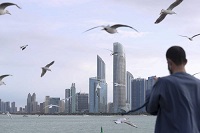 The UAE economy is set to grow by more than 6 per cent this year, after expanding by 3.8 per cent in 2021, buttressed by a rebound in tourism, construction, and activity related to the Expo 2020 Dubai, the International Monetary Fund has said.
The UAE economy is set to grow by more than 6 per cent this year, after expanding by 3.8 per cent in 2021, buttressed by a rebound in tourism, construction, and activity related to the Expo 2020 Dubai, the International Monetary Fund has said.
According to The National News, the IMF says an expansion of 6 per cent would be the highest since 2011, when the economy grew by 6.9 per cent.
The UAE economy expanded by 8.4 per cent in the first quarter of this year, exceeding initial estimates, as a result of higher oil prices and successful Covid-19 mitigation measures.
“Economic growth has been robust this year,” said Ali Al-Eyd, who led the IMF team that met UAE authorities from November 2 to November 17.
“Fiscal and external surpluses have increased further, benefitting from the higher oil prices, as well as the removal of the temporary Covid crisis-related fiscal support to businesses and households as the pandemic has gradually waned.
“Increased global uncertainty led to larger financial inflows, contributing to rapid real estate price growth in some segments.”
While oil prices have declined from well above $100 a barrel and were at a near two-month low on Monday, due to a slowing global economy and a potential drop in demand from China, Brent, the benchmark for two-thirds of the world’s crude, is still up 13 per cent year to date.
The UAE’s foreign trade for the first six months of this year exceeded Dh1 trillion ($272 billion), compared with Dh840 billion for the same period before the pandemic.
The tourism sector’s revenue topped Dh19 billion during the first half of this year and total hotel guests in the same period reached 12 million.
Growth in the number of hotel guests climbed 42 per cent, compared with the same period before the pandemic.
“Looking ahead, the UAE economic outlook remains positive, supported by domestic activity,” Mr Al-Eyd said.
The fund expects the country’s non-oil economy to grow by about 4 per cent in 2023 and to accelerate on continuing reforms.
Business activity in the UAE’s non-oil private sector economy continued to improve in October as new business and output climbed along with a rise in demand and employment.
The seasonally adjusted S&P Global purchasing managers’ index climbed to 56.6 in October, up from 56.1 in September, well above the neutral 50 mark separating expansion from contraction.
Inflationary pressures, which are relatively low in the UAE compared with the rest of the world, are expected to moderate gradually, Mr Al-Eyd said.
Inflation in the Emirates is projected to reach 5.6 per cent in 2022, according to the UAE Central Bank.
Further development of domestic capital markets, including through the issuance of local currency debt by the federal government will also support growth, Mr Al-Eyd said.
Despite global economic uncertainty and headwinds, higher oil prices and healthy fiscal buffers will help the UAE to mitigate risks, he said.
“Banks have adequate capital overall and abundant liquidity, and asset quality has improved modestly from pandemic-era peaks,” Mr Al-Eyd said.
The aggregate net income of the UAE’s 10 largest lenders grew more than 24 per cent in the first quarter of 2022, boosted by a significant jump in their net interest income, with the profitability of banks set to rise as interest rates increase further.
GCC banks will start next year on a solid footing and recover almost to pre-pandemic levels in 2022, S&P Global Ratings said in a report earlier this month.
“Domestic private sector credit growth has improved. Real estate price developments and expected further tightening of financial conditions underscore the importance of continued close monitoring of financial stability,” Mr Al-Eyd said.
“We welcome continued efforts by the Central Bank of the United Arab Emirates to strengthen the macroprudential framework and promote the effective management of non-performing loans.”
The IMF recognized and commended the UAE on “major efforts” related to its National Anti-Money Laundering and Countering the Financing of Terrorism Strategy and Action Plan to further strengthen the regulatory regime.
The UAE has seized and confiscated assets worth more than Dh4.73 billion ($1.29 billion) in the 12 months to the end of July, Hamid Al Zaabi, director general of the UAE’s Executive Office of Anti-Money Laundering and Countering the Financing of Terrorism (AML/CFT), told The National in an interview last month.
Assets worth Dh2.54 billion were seized by authorities while assets worth Dh2.19 billion were confiscated by UAE authorities in the one-year period.
The IMF said the further advancement of planned fiscal reforms, including the expected introduction of corporate tax and gradual phasing out of business fee structures will help to underpin growth and fiscal consolidation.
“Reforms under the UAE 2050 Strategy are welcome and should be sustained, with a focus on diversification of the economy, to ensure a balanced energy transition and strong long-term economic growth,” Mr Al-Eyd said.
“Ongoing structural reforms, such as those to support private sector employment and female labour force participation, increase trade and foreign investment, and harness the benefits of technology and education will help deliver sustainable and inclusive growth.” (NewsWire)
